NOAA research cruise supports key tropical Atlantic observing system

A PIRATA Northeast Extension mooring is recovered onto the deck of NOAA Ship Gordon Gunter. Credit: NOAA

A PIRATA Northeast Extension mooring is recovered onto the deck of NOAA Ship Gordon Gunter. Credit: NOAA
Crew and officers of NOAA Ship Gordon Gunter set sail from Pascagoula, Mississippi, on January 22, 2024, and returned to the same location over three months later after traveling more than 12,700 nautical miles (. During parts of the long voyage, NOAA researchers, academic partners, and students joined them to service moorings in the tropical Atlantic for the Prediction and Research Moored Array in the Tropical Atlantic (PIRATA) project and collect oceanographic and atmospheric samples in support of the PIRATA Northeast Extension.
PIRATA is a collaborative project between Brazil, France, and the United States to study and improve the predictability of air-sea interactions in the tropical Atlantic Ocean. Air-sea interactions, such as heat exchange between the ocean and atmosphere, exert changes in weather and climate. Measuring and observing how these interactions function improves our understanding and predictive capabilities of extreme weather and climate variations. PIRATA Northeast Extension is a joint project between NOAA’s Atlantic Oceanographic and Meteorological Laboratory (AOML) and NOAA’s Pacific Marine Environmental Laboratory (PMEL) that expands the PIRATA array of moored buoys into the northern and northeastern sectors of the tropical Atlantic Ocean. It is important for PIRATA scientists to collect measurements in this part of the ocean because this is the main development region for Atlantic hurricanes.